Potential 3 Year Rabies Vaccine for Cats Side Effects
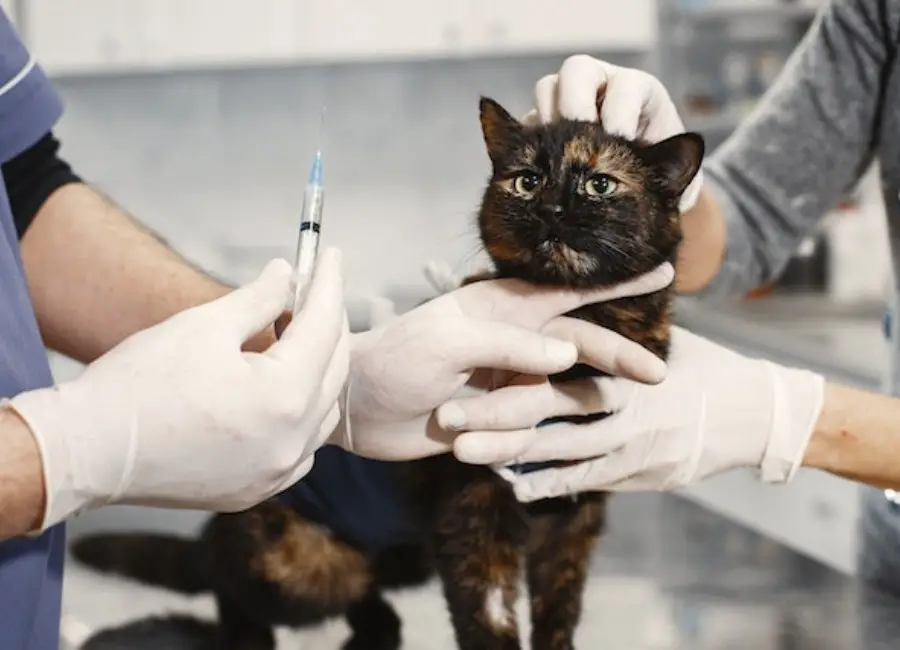
Let’s discuss some potential 3 year rabies vaccine for cats side effects…
Are you considering getting your furry friend a 3-year rabies vaccine but worried about the potential side effects? You’re not alone!
As pet owners, it’s natural to be concerned about our cat’s health and well-being.
In this post, we’re going to explore the side effects associated with the 3-year rabies vaccine for cats, so you can make the best decision for your furry friend.
Potential 3 Year Rabies Vaccine for Cats Side Effects
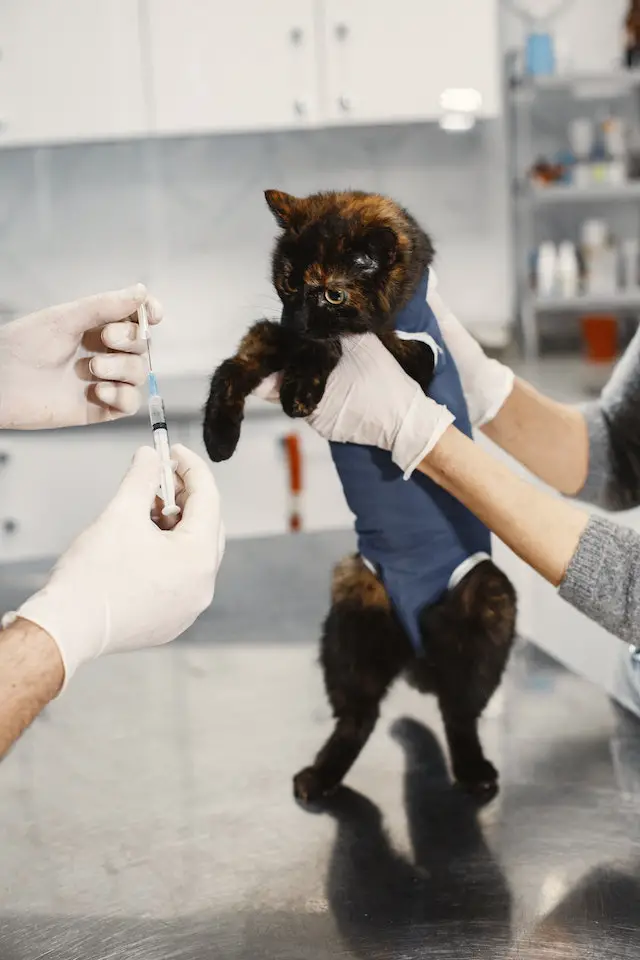
The following are some common 3 year rabies vaccine for cats side effects:
1. Sneezing or Nasal Discharge
The occasional slight sneezing or brief increase in nasal discharge following vaccination in cats is possible.
As the body adapts to the vaccine, these side effects typically go away on their own within a few days.
You should seek help from your veterinarian if your cat’s sneeze or nasal discharge worsens or is accompanied by other unsettling symptoms like trouble breathing or appetite loss.
If more treatment or testing is required, they might advise it.
2. Digestive Upset
Following vaccination, some cats may experience digestive problems like vomiting or diarrhea.
Numerous things, such as a sensitive stomach or a reaction to the vaccine’s ingredients, can be to blame for this.
You can delay eating for a few hours to give your digestive system a chance to settle in order to combat these adverse effects.
After the fasting time, gradually reintroduce a bland diet to help settle the stomach, such as boiled chicken and rice.
Keep an eye on your cat’s health, and get further advice from your veterinarian if any symptoms worsen or persist.
Learn more about what to feed a cat with diarrhea and vomiting.
3. Injection Site Reactions
Cats frequently feel some minor pain, swelling, or redness at the injection site after receiving the rabies vaccine.
This happens as a result of the body’s immunological reaction to the vaccine’s ingredients.
You can treat the region with an ice pack or cold compress wrapped in a towel for a few minutes many times a day to relieve these symptoms.
The discomfort is relieved and inflammation is reduced by the chilly temperature.
Additionally, watch out for your cat excessively licking or scratching the injection site as this might aggravate the area.
A veterinarian should be consulted if the swelling or redness gets worse or lasts for more than a few days.
4. Lethargy and Reduced Appetite
Following vaccination, cats frequently exhibit brief lethargicness and a drop in appetite.
This is a typical response from their body as it reacts to the immunization.
It’s crucial to give your cat space to unwind and a calm environment to rest in during this period.
To avoid dehydration, make sure fresh water is always accessible. If their hunger doesn’t improve within a day or two, keep an eye on it and consult a veterinarian.
5. Mild Fever
The rabies vaccine can have unintended side effects, including a moderate fever.
It is a reaction the body naturally has to the vaccination procedure. Rectal thermometers are a useful tool for keeping track of your cat’s body temperature.
You should get in touch with your veterinarian for more advice if they have a temperature of more than 103 °F (39.4 °C).
For the time being, make sure your cat has a cool, peaceful place to rest and provide lots of fresh water to prevent dehydration.
6. Allergic Reactions
Despite being uncommon, some cats may experience adverse responses to the rabies vaccine.
An allergic reaction may manifest as facial swelling, wheezing, hives, or vomiting.
It’s critical to get veterinarian care right away if you observe any of these symptoms.
When necessary, your veterinarian will treat you appropriately, which may entail using antihistamines or other medications to manage your symptoms, depending on how severe your allergic reaction was.
7. Swollen or Sore Joints
Following rabies vaccination, some cats may have slight joint swell or pain.
As the body’s immune system reacts to the vaccine, this may happen as a result of inflammation.
Give your cat a cozy place to rest and reduce their physical activity for a few days to make them more at ease.
Consult your veterinarian for a more thorough exam if the swelling or pain lasts or becomes worse.
If additional therapy is required, they could suggest methods for managing discomfort.
8. Behavioral Changes
After receiving a vaccination, brief behavioral changes could take place, such as increased restlessness or excessive grooming.
This can be because of the anxiety of the vet visit, the effects of the vaccine on the body, or a combination of things.
Provide your cat with a serene and quiet environment, soothe them with soothing activities, and stick to their regular habits to help them acclimate.
Consult your veterinarian for more assessment and advice if these behavioral changes last for a long time or cause your pet a lot of distress.
9. Vaccine-Associated Sarcoma
Vaccin-associated sarcoma (VAS), though exceedingly uncommon, is a significant possible adverse effect.
A particular kind of tumor known as VAS may appear near the injection site. Regularly inspecting the injection site for any lumps, bumps, or odd swelling is crucial.
Consult your veterinarian right away to schedule a follow-up examination if you observe any unusual changes, such as a persistent lump or swelling.
To rule out any potential concerns, your veterinarian will evaluate the situation and might suggest a biopsy or other diagnostic procedures.
10. Respiratory Issues
After vaccination, cats may in rare circumstances have respiratory problems including coughing or trouble breathing.
The co-occurrence of a respiratory illness and the vaccine is one of several causes of these symptoms.
It’s critical to get in touch with your veterinarian right away for a full evaluation if you notice any respiratory problems.
When your cat is experiencing respiratory distress, they will evaluate the situation and suggest the best course of action.
Learn more about health concerns in cats.
When to Contact Your Veterinarian
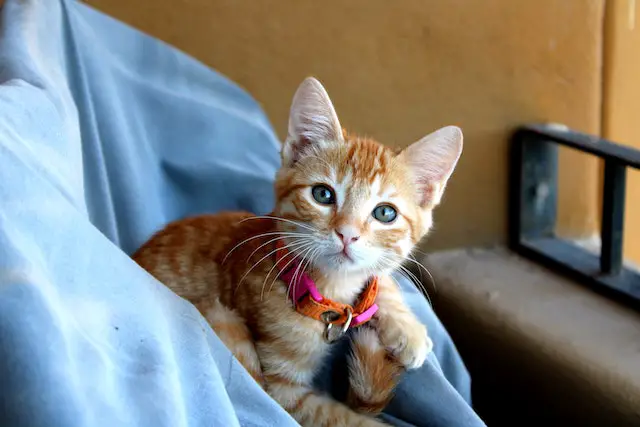
While most side effects of the 3-year rabies vaccine for cats are mild and self-limiting, it is important to seek veterinary care if you observe any of the following:
- Severe or persistent vomiting or diarrhea
- Difficulty breathing or swelling of the face
- Signs of extreme pain or distress
- Neurological symptoms such as seizures or tremors
Your veterinarian is the best resource for assessing your cat’s health and providing appropriate guidance based on their specific needs.
Managing the Side Effects of the 3-Year Rabies Vaccine for Cats
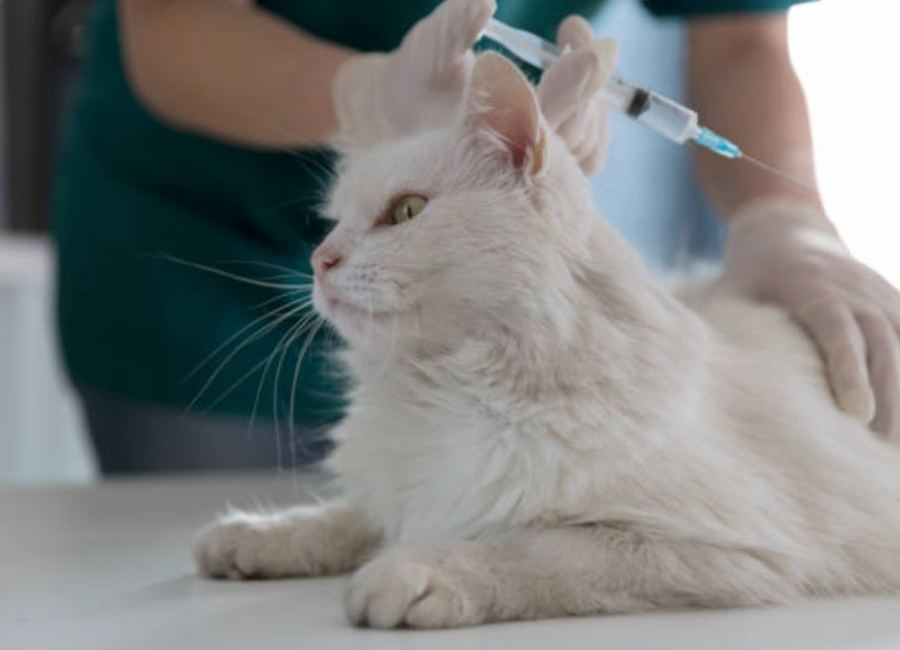
The 3-year rabies vaccine for cats is an important tool in preventing the spread of the rabies virus and ensuring the health and safety of both cats and humans.
However, like any vaccine, it can have side effects that pet owners should be aware of.
Here are some ways to manage the side effects of the 3-year rabies vaccine for cats:
- Monitor your cat closely: After your cat receives the rabies vaccine, it’s important to keep a close eye on them for any signs of side effects such as lethargy, loss of appetite, vomiting, or diarrhea. If you notice any of these symptoms, contact your veterinarian immediately.
- Provide plenty of fluids: Encourage your cat to drink plenty of water to help flush the vaccine from their system and reduce the risk of dehydration.
- Keep your cat comfortable: Make sure your cat has a comfortable place to rest and limit their physical activity for a few days after the vaccine.
- Administer a pain reliever: If your cat experiences pain or discomfort after the vaccine, your veterinarian may recommend giving them a pain reliever such as buprenorphine or tramadol.
- Seek veterinary care if necessary: In some cases, side effects from the rabies vaccine can be more severe and require veterinary care such as IV fluids or anti-nausea medications.
Remember, the benefits of the 3-year rabies vaccine far outweigh the potential side effects.
By working closely with your veterinarian and taking steps to manage any side effects, you can help ensure the health and safety of your cat and those around you.
Preventing the Side Effects of the 3 Year Rabies Vaccine for Cats
Here are some ways of preventing the side effects of the 3-year rabies vaccine for cats:
- Use a non-adjuvanted vaccine: Adjuvants are substances added to vaccines to enhance the immune response. However, some cats may develop adverse reactions to adjuvanted vaccines. Using a non-adjuvanted 3-year vaccine, which is now available, may reduce the risk of side effects.
- Vaccine titers: Before revaccinating your cat, you can ask your vet to perform a rabies vaccine titer test. This test measures the antibody levels in your cat’s blood to determine if it still has protection against rabies. If the titer is high, your cat may not need to be revaccinated, thus reducing the risk of side effects.
- Monitor for adverse reactions: After your cat has been vaccinated, it’s important to monitor for any adverse reactions. This includes signs such as lethargy, vomiting, diarrhea, or fever. If you notice any such signs, contact your vet immediately.
- Follow proper vaccination protocol: Ensuring that your cat receives the correct dose of the vaccine, at the right time, and through the proper route (either subcutaneously or intramuscularly) can help reduce the risk of side effects. Additionally, following proper storage and handling procedures for the vaccine can help maintain its potency and reduce the risk of adverse reactions.
Learn more about identifying a sick cat.
Benefits of Rabies Vaccine for a 3-year-old Cat
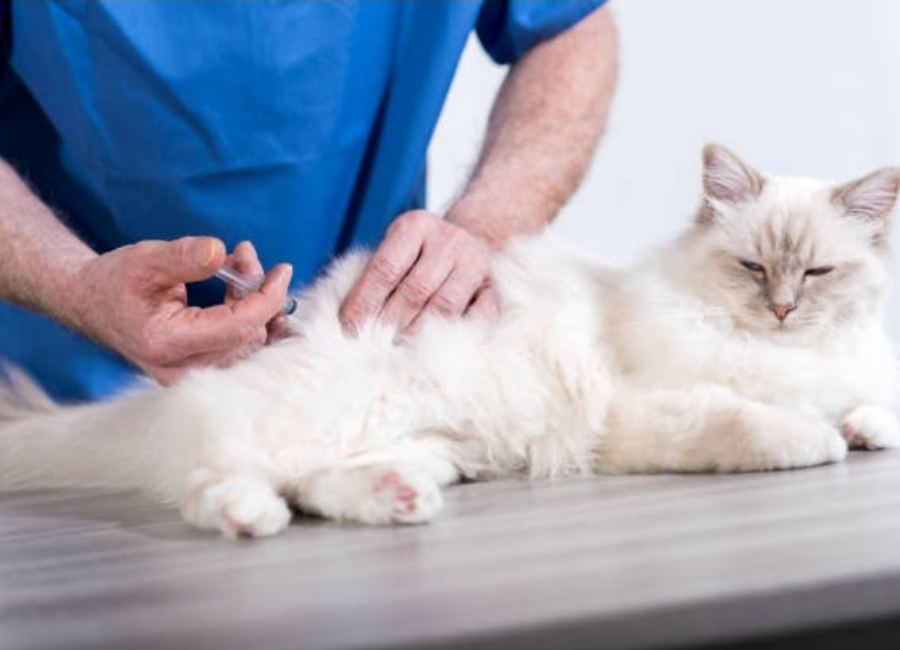
Rabies vaccine is an important vaccine for cats as well as dogs as it helps in protecting against the deadly rabies virus. The benefits of getting a rabies vaccine for a 3-year-old cat are many.
First and foremost, it protects the cat in case of exposure to rabies virus whether it is from a wild animal or from another pet who has been infected.
Rabies can be fatal to cats as well as humans, so getting vaccinated is very important.
Another benefit of the rabies vaccine for a 3-year-old cat is that it helps to protect the cat owner as well as their family members.
If a cat is infected with rabies, it can transmit the virus to humans through biting and scratching.
Rabies is a serious disease that requires immediate medical attention, and it can be life-threatening if not treated promptly.
It is important to note that some states in the US require cats to have a rabies vaccine by law. Therefore, you may not have an option but to get your cat vaccinated by law.
Learn more about why indoor cats need vaccines.
Related Questions
What side effects can my cat experience after getting a 3-year rabies vaccine?
Some common side effects may include mild fever, lethargy, and reduced appetite. However, serious side effects are rare.
How long do the side effects typically last?
The side effects usually last for only a day or two and disappear without any treatment.
Can my cat have an allergic reaction to the 3-year rabies vaccine?
Yes, although rare, cats can have an allergic reaction to any vaccine, including the 3-year rabies vaccine.
What are some symptoms of an allergic reaction to the 3-year rabies vaccine in cats?
Symptoms of an allergic reaction include vomiting, diarrhea, difficulty breathing, facial swelling, and collapse. If you notice any of these symptoms, contact your veterinarian immediately.
Is there any way to prevent the side effects of the 3-year rabies vaccine in my cat?
There is no surefire way to prevent side effects. However, you can help your cat by providing plenty of water and keeping them in a quiet and comfortable environment after the injection.
Can the 3-year rabies vaccine cause long-term effects in my cat?
There is no evidence to suggest that the 3-year rabies vaccine causes long-term effects in cats. However, it’s important to monitor your cat’s health after receiving the injection and consult with your veterinarian if you notice any changes.
Learn more about traumatized cat signs.
Conclusion
Thanks for sticking with me through this brief discussion about the 3 year rabies vaccine for cats and its potential side effects.
It’s always important to weigh the pros and cons when it comes to our pets’ health and well-being.
While the side effects listed may seem concerning, it’s important to remember that they are rare and the benefits of the vaccine far outweigh the risks.
Don’t skimp on keeping your feline friend up to date with their vaccinations. They’ll thank you for it in the long run!
